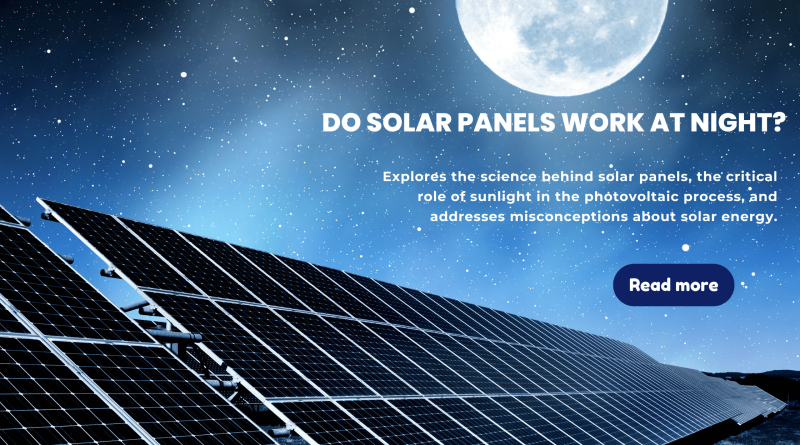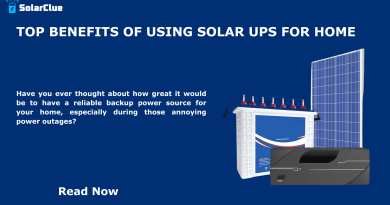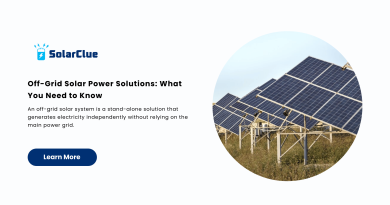Do Solar Panels Work At Night?
Solar energy has become a cornerstone of renewable energy solutions, providing a sustainable alternative to fossil fuels. However, a common question that arises is why solar panels don’t work at night. This blog explores the science behind solar panels, the critical role of sunlight in the photovoltaic process, and addresses misconceptions about solar energy. Additionally, it delves into energy storage solutions that enable the use of solar energy at night and looks at future advancements in solar technology.
Table of Contents
- 1 The Science Behind Solar Panels
- 2 The Importance of Sunlight for Solar Energy Production
- 2.1 Sunlight as the Primary Energy Source
- 2.2 Day-Night Cycle and Solar Panel Inactivity
- 2.3 Energy Storage Options for Nighttime Power
- 2.4 Benefits of Solar Batteries
- 2.5 Common Misconceptions About Solar Panels Working at Night
The Science Behind Solar Panels
Photovoltaic Cells and the Photovoltaic Effect
At the heart of solar panels are photovoltaic (PV) cells, which convert sunlight into electricity. This process is known as the photovoltaic effect. PV cells are made of semiconductor materials, typically silicon, which absorb photons from sunlight. When these photons hit the semiconductor, they knock electrons loose, creating an electric current.
Components of a Solar Panel System
A solar panel system comprises several key components:
- Solar Panels: Contain PV cells that capture sunlight.
- Inverter: Converts the direct current (DC) produced by the PV cells into alternating current (AC), which is used by most household appliances.
- Battery Storage: Stores excess energy produced during the day for use at night or during cloudy periods.
- Charge Controller: Regulates the voltage and current from the solar panels to the battery.
The Importance of Sunlight for Solar Energy Production
Sunlight as the Primary Energy Source
Sunlight is essential for the photovoltaic process. Without it, PV cells cannot generate electricity. During daylight hours, solar panels capture and convert sunlight into electrical energy. The intensity and angle of sunlight affect the efficiency of energy production, with peak efficiency typically occurring around midday when the sun is at its highest point.
Day-Night Cycle and Solar Panel Inactivity
Solar panels are inactive at night because there is no sunlight to initiate the photovoltaic effect. The absence of photons means no electrons are knocked loose in the semiconductor material, and thus, no electricity is produced. This natural limitation is one of the primary challenges of relying solely on solar energy.
Energy Storage Options for Nighttime Power
Solar Batteries
To address the limitation of solar panels not working at night, energy storage solutions like solar batteries are used. These batteries store excess energy produced during the day, which can then be used at night or during periods of low sunlight. Common types of solar batteries include lithium-ion, lead-acid, and flow batteries.
How Solar Batteries Work
- Charging: During the day, solar panels generate more electricity than is needed for immediate use. This excess energy charges the batteries.
- Discharging: At night or during cloudy days, the stored energy in the batteries is discharged to provide power to the home or business.
Benefits of Solar Batteries
- Energy Independence: Reduces reliance on the grid.
- Backup Power: Provides electricity during power outages.
- Cost Savings: Can reduce electricity bills by using stored energy during peak rate times.
Common Misconceptions About Solar Panels Working at Night
Myth: Solar Panels Generate Electricity Without Sunlight
A common misconception is that solar panels can generate electricity at night or during cloudy days without sunlight. While PV cells are designed to capture even diffuse sunlight on cloudy days, they cannot generate electricity in complete darkness.
Myth: Solar Panels Store Energy
Another misconception is that solar panels themselves store energy. In reality, solar panels only generate electricity; energy storage requires separate batteries.
The Future of Solar Technology and Potential Advancements
Advances in Solar Cell Efficiency
Researchers are continually working on improving the efficiency of solar cells. Emerging technologies, such as multi-junction cells and perovskite solar cells, show promise in significantly increasing the amount of electricity generated from sunlight.
Integrated Solar and Storage Systems
Future advancements may see more integrated solar and storage systems, where batteries are built into solar panels or designed to work seamlessly with them, improving efficiency and reducing costs.
Development of Solar Power at Night Solutions
Innovative approaches are being explored to harness solar power at night. One example is the development of solar thermal systems, which store the sun’s heat during the day to generate electricity at night. Another is the concept of nighttime photovoltaic cells that can capture and convert other forms of ambient energy.
Conclusion
Solar panels are a powerful tool for generating renewable energy, but their reliance on sunlight means they are inactive at night. Understanding the photovoltaic process highlights the importance of sunlight for solar energy production. Energy storage solutions like solar batteries are essential for making solar power available around the clock. As technology advances, the efficiency and integration of solar energy systems are expected to improve, offering even more robust solutions for sustainable energy needs.
Here at SolarClue®, we offer a smart, practical, and “beautiful” solution. You will be answered for all the questions related to Solar.
We provide all kinds of brands that are the Best Solar panels in India.
If you are the one who is planning for the solar power system. Don’t hesitate to contact our team!
Looking forward to empowering you with solar energy, just like hundreds of our other clients!
FAQs
1. Can solar panels generate electricity at night?
No, solar panels cannot generate electricity at night because they rely on sunlight to initiate the photovoltaic process.
2. What are the best energy storage options for solar power?
Solar batteries, such as lithium-ion, lead-acid, and flow batteries, are effective for storing excess solar energy produced during the day for use at night.
3. Do solar panels work on cloudy days?
Yes, solar panels can work on cloudy days, but their efficiency is reduced compared to sunny days.
4. Can I use solar energy during a power outage?
Yes, if you have a solar battery system, you can use stored solar energy during a power outage.
5. What advancements are being made in solar technology?
Advances include higher efficiency solar cells, integrated solar and storage systems, and innovative solutions for harnessing solar power at night.




